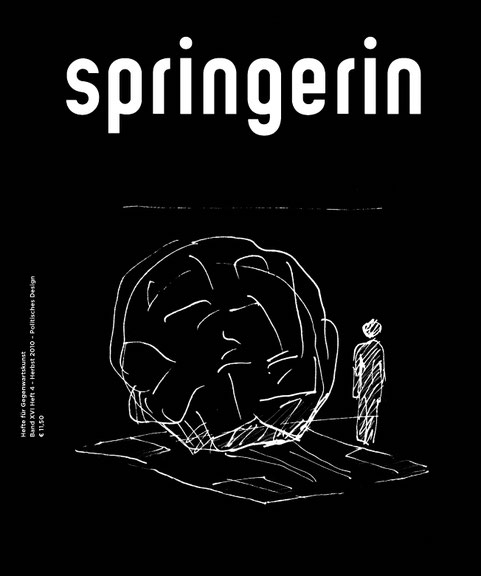Issue 4/2010
Political Design
Over the last few years, political upheavals and system changes have assumed a new position right at the heart of the culture of historical remembrance. »Magical« historical dates such as 1989 offer an opportunity at regular intervals to comment on what has happened from the perspective of those who survived, often with a slight sense of »history as written by the victors«. The memoirs of politicians and those who have gained from the new system often pay scant attention to what has proved in everyday life to be a tough, slow process of transition (with an uncertain outcome). To date the role played such system changes by a particular type of »political design« has all too often been overlooked; it includes logos, posters and brochures, not to mention banners or flags, printed works and a range of other media. It is high time to move this ... » read more
Net section
Laboratory of change
Das Israeli Center for Digital Art in Holon
Dietrich Heißenbüttel
Attending to reality
The first newly established Documentary Forum has been held in Berlin
Annett Busch
Digital film as the legacy of the »Third Cinema«?
On the possibilities of an imperfect postcolonial cinema
Naoko Kaltschmidt
Auf dem Prüfstand
Nat Muller
The Reverse Side of Media
Mechanisms of the inaudible and invisible as exemplified in the work of the artist Leif Elggren
Christian Höller
Distributed archives, content from the past, content for the future.
Alessandro Ludovico
A Website Is a Website Is ...
Artistic approaches to »single serving sites«
Franz Thalmair
Political Design
The moment that made a designer political
Keiko Sei
Political design in Asia and Europe
On the background and sections of the exhibition »Re-Designing the East«
Iris Dressler, Hans D. Christ
Queen, Gandhi and Limited Editions
Sethu Das
Language of the Other: Vernacular Thai and Designers' Identity
Pracha Suveeranont
Die Ethik des politischen Designs
Tomas Pospiszyl
Ikone als Streitobjekt
Maks Bochenek, Aneta Szylak
Retro rules
Over and above »orange« innovation, political design in Ukraine focuses on traditional visualisations of purportedly great moments of the past
Herwig G. Höller
Gérard Gasiorowski
An imaginary museum of conflicts. And a constant series of new questions.
Gislind Nabakowski
Artscribe
Die Idee des Kommunismus
Tim Stüttgen
»Goodbye London: Radical Art and Politics in the Seventies«
Jörn Ebner
»Practicing Memory in a Time of an All-encompassing Present«
Lara Conte
Christoph Schäfer »Auslaufendes Rot – Anti-Monument für die Rote Ruhr Armee «
Justin Hoffmann
»Vales un Potosí«/»Es ist ein Vermögen wert«
Kamen Nedev
Bildende Kunst im steirischen herbst 2010
Walter Seidl
»Partizipation. Politik der Gemeinschaft«
Daniel Pies
Marcel Broodthaers und Karl Larsson »Parrot«
Lars-Erik Hjertström Lappalainen
Josef Dabernig »Excursus on Fitness«
Nicola Hirner
Ana Torfs »Album/Tracks B«
Norbert Pfaffenbichler
»Friedl Kubelka <> Friedl vom Gröller«
Christa Benzer
Milica Tomić »Safety on the Road«
Susanne Neuburger
Books
Andrzej Szczerski:
Modernisations 1918–1939. The Future Perfect
Goschka Gawlik
Martin Kippenberger:
Musik 1979–1995
Christian Höller
Georges Didi-Huberman:
Formlose Ähnlichkeit oder die Fröhliche Wissenschaft des Visuellen nach Georges Bataille
Peter Kunitzky
Anton Kannemeyer:
Pappa in Afrika
Martin Reiterer
Sandra Schäfer:
stagings. Kabul, Film & Production of Representation
Marina Vishmidt
